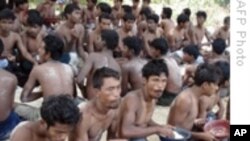<!-- IMAGE -->
Click here for Lao version ຄລິກບ່ອນນີ້ເພື່ອອ່ານພາສາລາວ
"Everywhere we look in
the world, [due to] conflict, famine, disease, the economy - we have refugees.
It is a very complex issue," said Hillary Rodham Clinton in January during
her confirmation hearings before the Senate Foreign Relations Committee:
"We have refugee populations,
some of decades-long standing and some of a few days standing, in so many
places. . . . I will do my very best to elevate this issue, we're going to make
this a high priority, and. . . . come up with solutions to some of our long-standing
refugee challenges."
According to Assistant Secretary of State for Population, Refugees and
Migration Eric Schwartz, some 42 million people around the world have been
uprooted by conflict and persecution. Women and children comprise the majority of
these highly vulnerable populations. 16 million of the displaced are refugees
outside of their countries, while 26 million have sought refuge inside their
countries. In addition, last year more than 235,000 people were killed and 214
million affected by natural disasters, with an economic cost estimated at 190
billion dollars. Those figures are far higher than the average for the past few
years.
The total U.S. contribution to global humanitarian efforts for 2009 had
previously been estimated at about $4.5 billion, not including aid efforts by
the U.S. military. And on August 19th, Assistant Secretary of State Schwartz
announced additional U.S. funding to support international humanitarian
assistance and protection efforts, as well as work to create conditions for
sustainable recovery. "We have a moral imperative to save lives,"
said Assistant Secretary of State Schwartz:
"If there's an international humanitarian crisis anywhere in the world,
the resources of the United States, of the Department of State and the U.S.
Agency for International Development, the civilian resources of the United
States, in one way or another, is likely to be there in support of protection
of victims."
U.S. humanitarian efforts are focused on more than just the crises that make
news headlines, said Assistant Secretary of State Schwartz. "That's not
what humanitarians are supposed to do, and it's not what we do. We try to keep
our attention focused anywhere in the world where large numbers of people are
suffering and the dimensions of the crisis require some degree of international
engagement."




